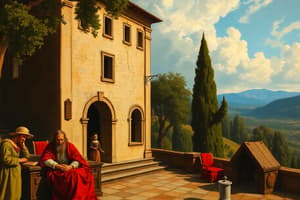Podcast
Questions and Answers
What does the term Renaissance mean?
What does the term Renaissance mean?
Rebirth and the start of modern Europe, reviving classical art and literature, philosophy, and learning.
How did Italy's geographic location assist in making it the 'birthplace of the Renaissance'?
How did Italy's geographic location assist in making it the 'birthplace of the Renaissance'?
Italy was geographically situated to take advantage of new trade.
Name two or three early centers of the Italian Renaissance.
Name two or three early centers of the Italian Renaissance.
Venice, Florence, Genoa, Milan.
Who was the Medici family and why were they significant during the Renaissance?
Who was the Medici family and why were they significant during the Renaissance?
What is humanism and how does it relate to the Renaissance?
What is humanism and how does it relate to the Renaissance?
Who was Machiavelli and what is the significance of his work, The Prince?
Who was Machiavelli and what is the significance of his work, The Prince?
What does the term 'Renaissance Man' mean?
What does the term 'Renaissance Man' mean?
How did the Renaissance revolutionize art with respect to perspective and realism?
How did the Renaissance revolutionize art with respect to perspective and realism?
What were Michelangelo's contributions to Renaissance art?
What were Michelangelo's contributions to Renaissance art?
Why is Leonardo da Vinci regarded as a Renaissance Man?
Why is Leonardo da Vinci regarded as a Renaissance Man?
Why is Petrarch considered the 'father of humanism'?
Why is Petrarch considered the 'father of humanism'?
What is the significance of Giovanni Boccaccio and his work, the Decameron?
What is the significance of Giovanni Boccaccio and his work, the Decameron?
Flashcards are hidden until you start studying
Study Notes
Renaissance Overview
- "Renaissance" translates to "rebirth" and marks the emergence of modern Europe.
- Signified a revival of classical art, literature, philosophy, and learning, notably from classical Rome and Greece.
- Characterized as a secular movement focusing on human experience.
Geographic Advantage of Italy
- Italy's strategic location fostered trade, which facilitated cultural and intellectual exchanges crucial for the Renaissance.
Key Italian Renaissance Cities
- Prominent centers include:
- Venice: Known as the "Queen of the Adriatic."
- Florence: The cultural heart of the Renaissance.
- Genoa: Significant for trade and culture.
- Milan: Influential in politics and art.
Medici Family Influence
- The Medici family rose to power in Florence, becoming the leading patrons of the arts and humanism.
- Lorenzo de' Medici, known as "Lorenzo the Magnificent," was a notable figure, promoting culture and status.
Humanism Movement
- Humanism, initiated by Petrarch, emphasized individual potential and accomplishments.
- Contrasted medieval scholasticism by focusing on classics without aligning them to Christian teachings.
- Encouraged the study of humanities including history, literature, and ethics to enrich human experience.
Niccolò Machiavelli and "The Prince"
- Machiavelli, an influential Renaissance thinker, authored "The Prince" in 1513.
- Offered pragmatic insights into political power, advocating for effectiveness over morality.
- Asserted that deceit and immoral actions were permissible to maintain authority.
Concept of the "Renaissance Man"
- Refers to individuals excelling in various domains such as arts, sciences, and sports, embodying well-roundedness.
- Renaissance Man epitomizes a cultured, skilled, and witty individual often from a wealthy background.
- Renaissance Woman portrayed as educated and an arts patron but did not seek fame.
Revolution in Art
- Renaissance artists focused on realism and perspective, emphasizing the human experience and individual dignity.
- Art aimed to reflect human life, promoting the idea of enjoying life in the present rather than anticipating an afterlife.
Michelangelo's Contributions
- Michelangelo excelled in multiple forms of art: painting, sculpture, and architecture.
- Known for masterpieces including the Sistine Chapel ceiling, "Pietà," "David," and "Moses."
- Hired by the Medici for artistic development and practice.
Leonardo da Vinci: The Archetype
- Renowned polymath, recognized as the original "Renaissance Man."
- Contributions spanned painting, geologist, chemist, anatomist, architect, and engineer.
- Left behind over 5000 pages of detailed notes on various subjects.
Petrarch: Father of Humanism
- Petrarch is deemed the "father of Renaissance Humanism" for his extensive engagement with classical texts.
- Advocated for a human-centric approach to learning, bridging ancient values with contemporary applications.
- Critiqued the Church's neglect of earthly concerns, promoting a broader understanding of humanity.
Giovanni Boccaccio and "The Decameron"
- Boccaccio, a friend of Petrarch, was an important poet and humanist.
- "The Decameron" consists of 100 short stories set against the backdrop of the Black Death, blending humor and tragedy.
- Incorporated classical themes and techniques of satire, influencing future storytelling and literature.
Studying That Suits You
Use AI to generate personalized quizzes and flashcards to suit your learning preferences.




